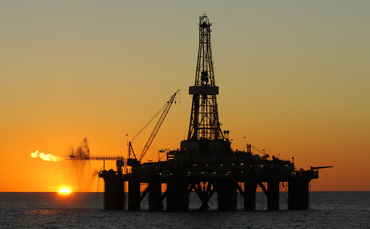The oil and gas industry has this week doubled down on claims that oil and gas development in the UK can help deliver on the UK’s climate goals, with an industry spokesperson telling BusinessGreen that reliance on imported oil and gas will come at “a higher cost to the consumer, our economy, and ultimately, the climate”.
A report into the sector’s operational emissions published last week by the industry body Offshore Energies UK hailed a 24 per cent decline in emissions and a 45 per cent cut in methane emissions from oil and gas operators in the UK.
Controversially, the report positioned the sector’s ongoing efforts to reduce its production emissions as justification to press ahead with oil and gas projects in the North Sea. The study notes the emissions footprint of imported fossil gas from Qatar, the US, and Peru – the UK’s three main suppliers of liquified natural gas (LNG) – is four times higher than that of the UK.
The report comes amid significant concern among campaigners about the UK’s plans to press ahead with a swathe of new oil and gas licenses despite the ever-worsening climate crisis. The Rosebank oil field that was approved last month is expected to generate 200 million tonnes of emissions over its lifetime, with critics warning it is set to seriously undermine the UK’s climate goals.
But in the introduction to its new report, sustainability director at the OEUK Michael Tholen argued that “further investment in the [North Sea] basin to reduce [the UK’s] dependency on imports” would trigger a “virtuous cycle” of decarbonisation. The sector insists it is committed to a gradual phase out of oil and gas production in the declining North Sea basin, but maintains that investment in new projects would enable the UK to more effectively manage supply and demand.
In a comment emailed to BusinessGreen yesterday in response to coverage of the emissions footprint report earlier this week, OEUK said efforts to reduce the UK’s reliance on fossil fuel imports would enable the country “to take control” of its oil and gas production emissions.
“The Climate Change Committee recognises by the mid-2030s, oil and gas will still provide at least half of our energy needs, and that from a UK-perspective, it is better that we produce those resources domestically during the interim,” they said. “This ensures we can remain in control of our own carbon footprint, keep industry on track to meet its emissions goals, and continue scaling up the solutions, like hydrogen and carbon capture, we will need to reach net zero.
“We must also ensure we wean off supply at the same time as demand, or we will become ever-more reliant on imported oil and gas at a higher cost to the consumer, our economy, and ultimately, the climate.”
While gas piped from Norway – the UK’s main supplier of the fossil fuel – is significantly less emissions-intensive than domestic production, the UK’s oil and gas industry maintains that any reduction in domestic fossil fuel production would result in more imports of LNG, which is significantly more emissions intensive and must be delivered by ship.
Critics have pushed back against the use of such arguments to justify new oil and gas projects in the North Sea, arguing that while it is technically true the UK could shrink its emissions footprint by cutting down on imports, new oil and gas fields could hurt the drive to bring down emissions globally. This is because increased domestic production in the UK will not necessarily lead to a drop in fossil fuel production elsewhere.
Green groups have also warned that new oil and gas production in the North Sea will hurt the UK’s standing as a climate leader and its ability to call on other countries to phase down their reliance on fossil fuels.
Scientists and energy experts have called for a rapid phase down of fossil fuel supplies, and have warned that no new oil and gas expansion must take place if the world is to stand a chance of capping global temperature increases below the 1.5C goal contained in the Paris Agreement.
As such, green groups have urged the UK government to halt oil and gas licensing for new projects and invest more heavily in clean energy projects, which can generate jobs and bring wholesale energy prices down in the long run because they reduce the UK’s exposure to volatile fossil fuel prices, which are set internationally.
Offshore Energies UK said North Sea operators had a critical role to play in delivering decarbonisation of the UK’s economy, as major investors and developers of clean technologies.
“Around 60 per cent of the UK’s decarbonisation efforts can take place in the North Sea, thanks to our world-class supply chain and expertise paired with innovations like carbon capture, hydrogen, and offshore wind,” the spokesperson for the group said. “In 2022, the sector reduced production emissions by 24 per cent, halved flaring and venting, and cut methane emissions by 45 per cent compared to 2018. This is an industry committed to providing cleaner power, fuel, and products to the UK.”
The OEUK spokesperson also stressed the industry’s commitment to climate action and the net zero targets set out in the North Sea Transition deal agreed between government and industry in 2021. “As one of the first industrial sectors to commit to net zero, the offshore oil and gas sector has set itself ambitious emissions reduction goals, which it is on-track to achieve,” the spokesperson said.
The North Sea Transition Deal saw the industry commit to a 50 per cent decline in oil and gas emissions by 2030. However, the Climate Change Committee has said the industry should increase its ambition and aim for a 68 per cent reduction, a target that was backed by Chris Skidmore’s Net Zero Review and the Environmental Audit Committee of MPs.
Last week’s emissions report does not include information about the Scope 3 emissions of the sector, which would provide a more complete picture of the climate impact of oil and gas produced in the UK. OEUK said there is currently no commonly agreed methodology for tracking these emissions.
Keep up to date with all the latest green business news by signing up to the free Daily and Weekly BusinessGreen Newsletters.










